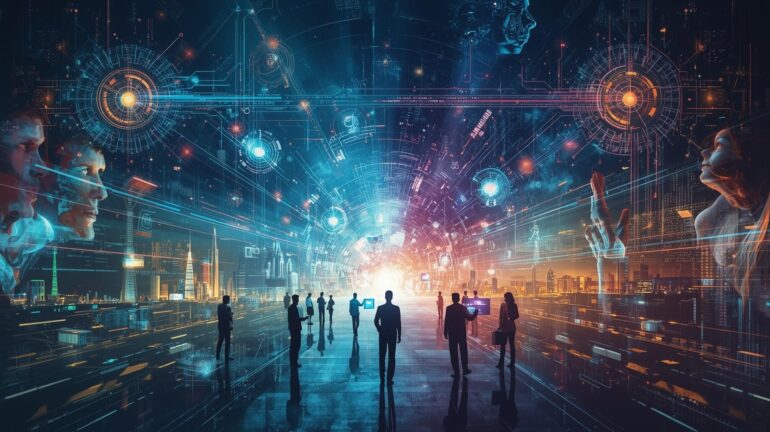
Artificial Intelligence (AI) has quickly evolved from a futuristic concept into a defining force of the 21st century. From powering recommendation engines on streaming platforms to enabling self-driving cars, AI is no longer confined to research labs it is integrated into everyday life. As industries embrace this powerful technology, the question is no longer whether AI will shape the future, but how it will redefine economies, societies, and human experiences. The opportunities are vast, yet the challenges demand equal attention.
One of the greatest opportunities lies in business transformation. AI-driven automation is streamlining operations, reducing costs, and improving efficiency across industries. In finance, AI algorithms detect fraudulent transactions within seconds. In retail, predictive analytics enhances customer experiences by anticipating needs and offering personalized recommendations. Meanwhile, in logistics and supply chain management, AI optimizes routes and reduces waste, cutting both expenses and emissions. For businesses willing to adapt, AI is not just a tool it is a competitive advantage.
The healthcare sector exemplifies AI’s potential to transform lives. AI-powered diagnostic tools are achieving accuracy levels comparable to, and in some cases exceeding, human doctors. From analyzing medical imaging for early detection of cancer to predicting patient deterioration in intensive care units, AI is augmenting decision-making for physicians. Robotics and AI-driven assistants are also enabling more precise surgeries and improving patient monitoring. With an aging global population and rising healthcare costs, AI is emerging as a critical partner in creating scalable, affordable, and more effective healthcare solutions.
Another opportunity lies in education and workforce development. AI-driven platforms can personalize learning, offering tailored pathways based on a student’s strengths and weaknesses. Virtual tutors, adaptive assessments, and interactive learning environments are helping to bridge gaps in access and quality. On the workforce side, AI tools are assisting professionals by automating repetitive tasks, freeing time for creativity and higher-level problem-solving. For example, lawyers are using AI to review documents faster, while architects are relying on AI-generated design models to explore new possibilities.
At the societal level, AI-powered smart cities are becoming a reality. Governments are using AI to manage traffic flow, optimize energy consumption, and improve public safety. In the UAE, smart city initiatives powered by AI are driving sustainability, efficiency, and innovation. From AI-assisted policing to real-time environmental monitoring, these applications show how AI can make urban living more efficient and responsive to citizens’ needs.
Yet alongside these opportunities are significant challenges that cannot be ignored. The first is ethics and accountability. As AI systems make decisions that affect lives, questions arise: Who is responsible when an autonomous car causes an accident? Can an algorithm used in hiring processes be truly free from bias? Without clear frameworks, AI risks amplifying existing inequalities or creating new ones. Ethical AI development, transparency in algorithms, and accountability structures must evolve in step with technological progress.
Another pressing concern is the impact on employment. While AI will create new jobs in areas like machine learning engineering, AI ethics, and robotics, it will also displace millions of traditional roles. Workers in transportation, customer service, and manufacturing face the greatest risks. The challenge for governments and organizations will be to reskill workers at scale and create pathways for a workforce that collaborates with, rather than competes against, machines.
Privacy and security also stand at the forefront of challenges. AI systems are fueled by data, and the more data they consume, the more powerful they become. However, this reliance raises risks of surveillance, misuse, and breaches. Striking a balance between innovation and privacy protection will require strong regulations and international cooperation. Cybersecurity threats are also evolving as AI itself is being used to develop more sophisticated attacks, forcing defenders to adopt equally advanced AI-driven countermeasures.
Finally, there is the challenge of trust. Public confidence in AI systems is fragile. Misuse, bias, or poorly explained outcomes can erode trust quickly. Building explainable AI systems that can clearly communicate how and why they make decisions will be essential to gaining widespread acceptance.
Looking ahead, the future of AI is not a binary tale of promise or peril it is both. The opportunities are extraordinary: smarter cities, healthier populations, more efficient businesses, and personalized education. But the risks bias, job displacement, privacy erosion, and ethical dilemmas are equally significant. Navigating this duality requires collaboration between governments, private enterprises, researchers, and civil society.
The world is entering an era where AI will not simply be a tool but a partner in shaping humanity’s future. Like every transformative technology, its impact will depend on how responsibly it is developed and deployed. Those who embrace its opportunities while proactively addressing its challenges will not only stay ahead but also help define a more inclusive, intelligent, and equitable future.